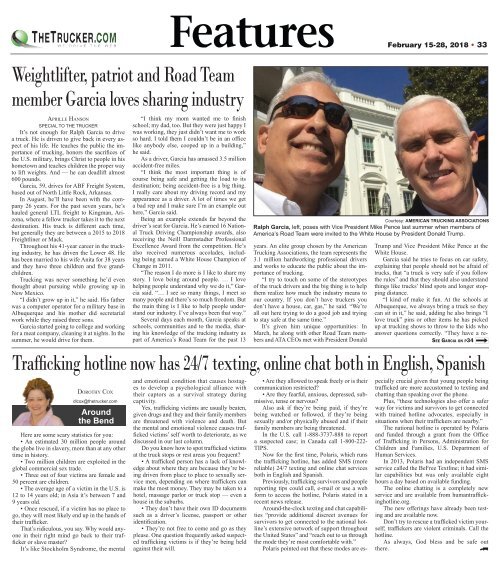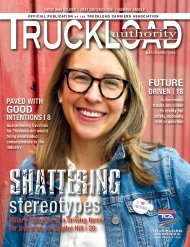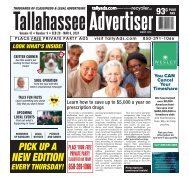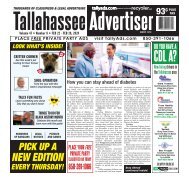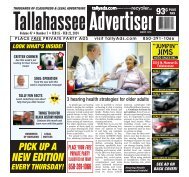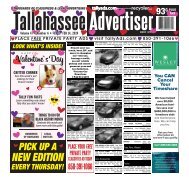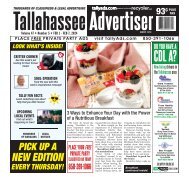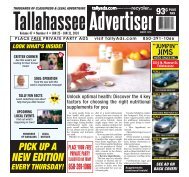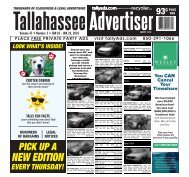TT_021518_AllPages
Create successful ePaper yourself
Turn your PDF publications into a flip-book with our unique Google optimized e-Paper software.
Features<br />
February 15-28, 2018 • 33<br />
Weightlifter, patriot and Road Team<br />
member Garcia loves sharing industry<br />
Aprille Hanson<br />
SPECIAL TO THE TRUCKER<br />
It’s not enough for Ralph Garcia to drive<br />
a truck. He is driven to give back in every aspect<br />
of his life. He teaches the public the importance<br />
of trucking, honors the sacrifices of<br />
the U.S. military, brings Christ to people in his<br />
hometown and teaches children the proper way<br />
to lift weights. And — he can deadlift almost<br />
600 pounds.<br />
Garcia, 59, drives for ABF Freight System,<br />
based out of North Little Rock, Arkansas.<br />
In August, he’ll have been with the company<br />
26 years. For the past seven years, he’s<br />
hauled general LTL freight to Kingman, Arizona,<br />
where a fellow trucker takes it to the next<br />
destination. His truck is different each time,<br />
but generally they are between a 2015 to 2018<br />
Freightliner or Mack.<br />
Throughout his 41-year career in the trucking<br />
industry, he has driven the Lower 48. He<br />
has been married to his wife Anita for 38 years<br />
and they have three children and five grandchildren.<br />
Trucking was never something he’d even<br />
thought about pursuing while growing up in<br />
New Mexico.<br />
“I didn’t grow up in it,” he said. His father<br />
was a computer operator for a military base in<br />
Albuquerque and his mother did secretarial<br />
work while they raised three sons.<br />
Garcia started going to college and working<br />
for a meat company, cleaning it at nights. In the<br />
summer, he would drive for them.<br />
Here are some scary statistics for you:<br />
• An estimated 30 million people around<br />
the globe live in slavery, more than at any other<br />
time in history.<br />
• Two million children are exploited in the<br />
global commercial sex trade.<br />
• Three out of four victims are female and<br />
50 percent are children.<br />
• The average age of a victim in the U.S. is<br />
12 to 14 years old; in Asia it’s between 7 and<br />
9 years old.<br />
• Once rescued, if a victim has no place to<br />
go, they will most likely end up in the hands of<br />
their trafficker.<br />
That’s ridiculous, you say. Why would anyone<br />
in their right mind go back to their trafficker<br />
or slave master?<br />
It’s like Stockholm Syndrome, the mental<br />
“I think my mom wanted me to finish<br />
school; my dad, too. But they were just happy I<br />
was working, they just didn’t want me to work<br />
so hard. I told them I couldn’t be in an office<br />
like anybody else, cooped up in a building,”<br />
he said.<br />
As a driver, Garcia has amassed 3.5 million<br />
accident-free miles.<br />
“I think the most important thing is of<br />
course being safe and getting the load to its<br />
destination; being accident-free is a big thing.<br />
I really care about my driving record and my<br />
appearance as a driver. A lot of times we get<br />
a bad rep and I make sure I’m an example out<br />
here,” Garcia said.<br />
Being an example extends far beyond the<br />
driver’s seat for Garcia. He’s earned 16 National<br />
Truck Driving Championship awards, also<br />
receiving the Neill Darmstadter Professional<br />
Excellence Award from the competition. He’s<br />
also received numerous accolades, including<br />
being named a White House Champion of<br />
Change in 2011.<br />
“The reason I do more is I like to share my<br />
story. I love being around people. … I love<br />
helping people understand why we do it,” Garcia<br />
said. “… I see so many things, I meet so<br />
many people and there’s so much freedom. But<br />
the main thing is I like to help people understand<br />
our industry. I’ve always been that way.”<br />
Several days each month, Garcia speaks at<br />
schools, communities and to the media, sharing<br />
his knowledge of the trucking industry as<br />
part of America’s Road Team for the past 13<br />
and emotional condition that causes hostages<br />
to develop a psychological alliance with<br />
their captors as a survival strategy during<br />
captivity.<br />
Yes, trafficking victims are usually beaten,<br />
given drugs and they and their family members<br />
are threatened with violence and death. But<br />
the mental and emotional violence causes trafficked<br />
victims’ self worth to deteriorate, as we<br />
discussed in our last column.<br />
Do you know how to spot trafficked victims<br />
at the truck stops or rest areas you frequent?<br />
• A trafficked person has a lack of knowledge<br />
about where they are because they’re being<br />
driven from place to place to sexually service<br />
men, depending on where traffickers can<br />
make the most money. They may be taken to a<br />
hotel, massage parlor or truck stop — even a<br />
house in the suburbs.<br />
• They don’t have their own ID documents<br />
such as a driver’s license, passport or other<br />
identification.<br />
• They’re not free to come and go as they<br />
please. One question frequently asked suspected<br />
trafficking victims is if they’re being held<br />
against their will.<br />
Courtesy: AMERICAN TRUCKING ASSOCIATIONS<br />
Ralph Garcia, left, poses with Vice President Mike Pence last summer when members of<br />
America’s Road Team were invited to the White House by President Donald Trump.<br />
years. An elite group chosen by the American<br />
Trucking Associations, the team represents the<br />
3.1 million hardworking professional drivers<br />
and works to educate the public about the importance<br />
of trucking.<br />
“I try to touch on some of the stereotypes<br />
of the truck drivers and the big thing is to help<br />
them realize how much the industry means to<br />
our country. If you don’t have truckers you<br />
don’t have a house, car, gas,” he said. “We’re<br />
all out here trying to do a good job and trying<br />
to stay safe at the same time.”<br />
It’s given him unique opportunities: In<br />
March, he along with other Road Team members<br />
and ATA CEOs met with President Donald<br />
Trump and Vice President Mike Pence at the<br />
White House.<br />
Garcia said he tries to focus on car safety,<br />
explaining that people should not be afraid of<br />
trucks, that “a truck is very safe if you follow<br />
the rules” and that they should also understand<br />
things like trucks’ blind spots and longer stopping<br />
distance.<br />
“I kind of make it fun. At the schools at<br />
Albuquerque, we always bring a truck so they<br />
can sit in it,” he said, adding he also brings “I<br />
love truck” pins or other items he has picked<br />
up at trucking shows to throw to the kids who<br />
answer questions correctly. “They have a re-<br />
See Garcia on p34 m<br />
Trafficking hotline now has 24/7 texting, online chat both in English, Spanish<br />
Dorothy Cox<br />
dlcox@thetrucker.com<br />
Around<br />
the Bend<br />
• Are they allowed to speak freely or is their<br />
communication restricted?<br />
• Are they fearful, anxious, depressed, submissive,<br />
tense or nervous?<br />
Also ask if they’re being paid, if they’re<br />
being watched or followed, if they’re being<br />
sexually and/or physically abused and if their<br />
family members are being threatened.<br />
In the U.S. call 1-888-3737-888 to report<br />
a suspected case; in Canada call 1-800-222-<br />
TIPS.<br />
Now for the first time, Polaris, which runs<br />
the trafficking hotline, has added SMS (more<br />
reliable) 24/7 texting and online chat services<br />
both in English and Spanish.<br />
Previously, trafficking survivors and people<br />
reporting tips could call, e-mail or use a web<br />
form to access the hotline, Polaris stated in a<br />
recent news release.<br />
Around-the-clock texting and chat capabilities<br />
“provide additional discreet avenues for<br />
survivors to get connected to the national hotline’s<br />
extensive network of support throughout<br />
the United States” and “reach out to us through<br />
the mode they’re most comfortable with.”<br />
Polaris pointed out that these modes are especially<br />
crucial given that young people being<br />
trafficked are more accustomed to texting and<br />
chatting than speaking over the phone.<br />
Plus, “these technologies also offer a safer<br />
way for victims and survivors to get connected<br />
with trained hotline advocates, especially in<br />
situations when their traffickers are nearby.”<br />
The national hotline is operated by Polaris<br />
and funded through a grant from the Office<br />
of Trafficking in Persons, Administration for<br />
Children and Families, U.S. Department of<br />
Human Services.<br />
In 2013, Polaris had an independent SMS<br />
service called the BeFree Textline; it had similar<br />
capabilities but was only available eight<br />
hours a day based on available funding.<br />
The online chatting is a completely new<br />
service and are available from humantraffickinghotline.org.<br />
The new offerings have already been testing<br />
and are available now.<br />
Don’t try to rescue a trafficked victim yourself;<br />
traffickers are violent criminals. Call the<br />
hotline.<br />
As always, God bless and be safe out<br />
there. 8


